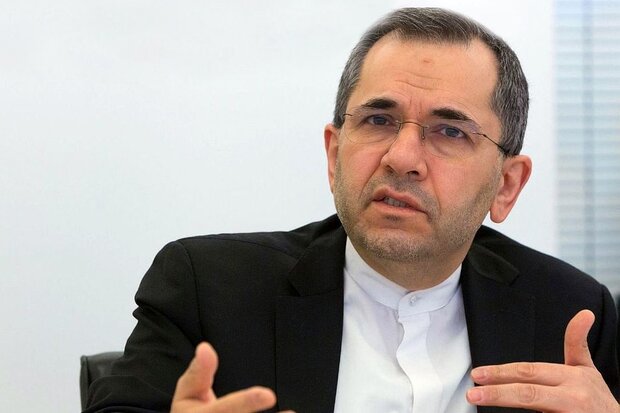Call for UN Engagement to Defuse Regional Tensions

EghtesadOnline: Iran has called for the United Nations' "active engagement" to facilitate dialogue among Persian Gulf countries so as to ease the "current complex security environment" in the region.
Iran's Ambassador to the UN Majid Takht-Ravanchi made the request in a letter to Secretary-General Antonio Guterres and the UN Security Council on Monday, IRNA reported.
He described the situation in the Persian Gulf region as alarming, warning that "if unchecked, the current situation might—sooner or later—go beyond the perimeter of control and thereby lead to another unnecessary regional crisis".
Animosity between the United States and Iran has intensified in recent months, raising concerns over a potential conflict in the region, although both countries declare they do not seek war, Financial Tribune reported.
Tensions resurfaced between the arch-foes following the US withdrawal from Iran's 2015 nuclear deal (known as the Joint Comprehensive Plan of Action) and its reimposition of sanctions on Tehran last year.
The situation has escalated over the past month, with the US sending warships and bombers to the Persian Gulf and Iran suspending compliance with part of its JCPOA obligations.
The dispute has increased friction between Iran and US allies in the region, namely Saudi Arabia and the UAE.
This was triggered by a sabotage attack on four oil tankers off the coast of the port city of Fujairah, UAE, and a drone attack on an oil pipeline in Saudi Arabia.
It is not yet clear who was behind the tanker attack, but the Yemeni Houthi movement has claimed the raid on pipelines, with Saudi leaders blaming Iran.
Tehran has denied responsibility for either incident.
Outside Circles
In his letter, Takht-Ravanchi blamed the strained relations on "certain circles from outside of this region", which seek to sow further discord and create more mistrust among Persian Gulf countries.
"In turn, Iran has always rejected and continues to reject conflict and war. Iran will never choose war as an option or strategy in pursuing its foreign policy," he said.
However, he pointed out that if war is imposed on Iran, it will "vigorously exercise its inherent right to self-defense".
The UN envoy stressed that the international community and the world body must not remain indifferent since a possible conflict will definitely cross over from the regional level soon, seriously affecting international peace and security.
Takht-Ravanchi strongly advised against inaction, calling for the adoption of "a win-win approach through active engagement".
"In view of the Islamic Republic of Iran, the current complex security environment in the region can be eased and ultimately addressed exclusively through constructive engagement and dialogue between the littoral states of the Persian Gulf," he said.
Regional Dialogue
Citing paragraph eight of Security Council Resolution 598 that entrusts the secretary-general with examining “measures to enhance the security and stability of the region", Takht-Ravanchi urged Guterres to implement this paragraph and furnish the international umbrella for launching such a regional dialogue.
Earlier on Monday, UN Spokesman Stephane Dujarric voiced concern over the rising rhetoric between Washington and Tehran, warning that any action by either nation could be misinterpreted in a "very volatile region".
"We would ask all parties to lower the rhetoric and to lower the threshold of action as well," he told reporters at a regular briefing.
UN officials are in touch with the US and Iran at various levels to try to calm the situation, Dujarric said, without providing details.
The European Commission also on Monday called on the US and Iran to “avoid provocations” that will cause further destabilization in the region.
“The region does not need any further elements of destabilization. This is something that we have been saying consistently,” said Maja Kocijancic, the EU foreign affairs and security policy spokeswoman.


